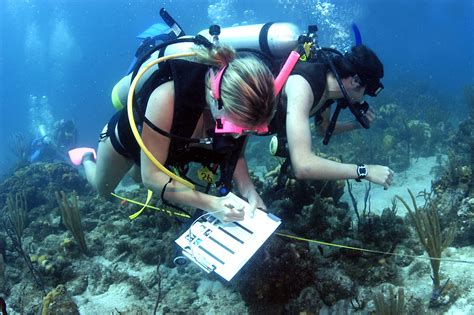Aquatic biology, a captivating branch of science, unravels the mysteries of aquatic ecosystems and the organisms that inhabit them. With a growing understanding of the critical role these systems play in sustaining life on Earth, the demand for skilled professionals in aquatic biology has soared.

Explore Diverse Career Paths
Aquatic biologists embark on various rewarding career paths, including:
- Fisheries Biologist: Study, manage, and conserve fish populations in marine and freshwater environments.
- Aquaculturist: Develop and implement sustainable techniques for raising aquatic organisms for food, recreation, or pharmaceuticals.
- Marine Biologist: Investigate the biology, ecology, and conservation of marine organisms in oceans and coastal areas.
- Limnologist: Focus on the ecology of freshwater ecosystems, including lakes, rivers, and wetlands.
- Oceanographer: Study the physical, chemical, and biological characteristics of oceans and their interaction with the atmosphere.
- Environmental Scientist: Address environmental issues related to aquatic ecosystems, such as pollution, climate change, and habitat loss.
Job Market Outlook and Salary Expectations
The job market for aquatic biologists is highly competitive, with a projected growth rate of 5% from 2021 to 2031, according to the U.S. Bureau of Labor Statistics. Salaries vary depending on experience, education, and location. However, the median annual salary for aquatic biologists in the United States is around $79,000.
Qualifications and Education
Most entry-level aquatic biology positions require a bachelor’s degree in aquatic biology, biology, environmental science, or a related field. Advanced degrees, such as master’s or doctoral degrees, are often preferred for more specialized roles. Additionally, strong field experience, laboratory skills, and proficiency in statistical software are essential for success in this field.
The Importance of Aquatic Biology
Aquatic ecosystems encompass a vast array of organisms that provide vital services to humans, including:
- Food Source: Fish and shellfish are a significant dietary source of protein for billions of people worldwide.
- Biodiversity: Aquatic ecosystems are home to an astonishing array of species, contributing to the overall health and stability of the planet.
- Water Filtration: Wetlands and other aquatic systems naturally filter pollutants from water, ensuring clean water for human use.
- Carbon Sequestration: Oceans and coastal wetlands absorb enormous amounts of carbon dioxide from the atmosphere, mitigating climate change.
- Recreation and Tourism: Aquatic environments provide opportunities for fishing, boating, swimming, and other recreational activities, supporting the tourism industry.
Innovative Applications of Aquatic Biology
Emerging technologies and innovative ideas are opening up new avenues for aquatic biologists. Some examples include:
- Biomimicry: Engineers draw inspiration from aquatic organisms to design novel solutions for problems in fields such as energy, transportation, and medicine.
- Aquaculture Technology: Advances in artificial intelligence and robotics are revolutionizing the aquaculture industry, enabling more sustainable and efficient fish farming practices.
- Marine Biotechnology: Genetic engineering and other techniques are being used to develop new drugs, treatments, and sustainable products from marine organisms.
Useful Tables
| Table 1: Top Employers of Aquatic Biologists |
|—|—|
| U.S. Fish and Wildlife Service | National Oceanic and Atmospheric Administration |
| Environmental Protection Agency | State Fish and Wildlife Agencies |
| Universities and Research Institutions | Wildlife Conservation Organizations |
| Table 2: Median Annual Salaries for Aquatic Biologists |
|—|—|
| Entry-Level (Bachelor’s Degree) | $60,000-$70,000 |
| Mid-Level (Master’s Degree) | $75,000-$90,000 |
| Senior-Level (Ph.D.) | $100,000+ |
| Table 3: Growing Career Areas in Aquatic Biology |
|—|—|
| Climate Change Impacts on Aquatic Ecosystems | Sustainable Aquaculture |
| Underwater Robotics | Marine Biotechnology |
| Environmental Law and Policy | Conservation Genetics |
| Table 4: Aquatic Biology Education Programs |
|—|—|
| University of Washington | Oregon State University |
| University of California, Davis | Virginia Institute of Marine Science |
| Duke University | University of Miami |
Frequently Asked Questions
1. What are the prerequisites for a career in aquatic biology?
A strong background in biology, chemistry, and math is highly recommended. Field experience and laboratory skills are also valuable assets.
2. What are the challenges of working as an aquatic biologist?
Aquatic biologists often work in remote or challenging environments, requiring adaptability and physical stamina. They may also face unpredictable weather conditions and limited access to resources.
3. What are the benefits of a career in aquatic biology?
Aquatic biologists have the opportunity to make a real difference in protecting and preserving our planet’s water resources. They also enjoy a dynamic and rewarding career that offers ample opportunities for growth and exploration.
4. How can I break into the field of aquatic biology?
Gaining field experience through internships or volunteer work is crucial. Networking with professionals in the industry and pursuing further education can also enhance your chances of success.
5. Are there opportunities for specialization within aquatic biology?
Yes, aquatic biologists can specialize in various areas, such as fisheries management, marine ecology, limnology, and environmental science.
6. What emerging technologies are reshaping the field of aquatic biology?
Machine learning, remote sensing, and genetic engineering are among the emerging technologies that are advancing our understanding and management of aquatic ecosystems.
7. What are some non-traditional career paths for aquatic biologists?
Aquatic biologists can also work in policy, education, and conservation advocacy, leveraging their scientific knowledge to inform decision-making and promote environmental stewardship.
8. How can I stay up-to-date on the latest advancements in aquatic biology?
Attending conferences, reading scientific journals, and connecting with other professionals in the field are effective ways to stay informed about the latest research and developments.
